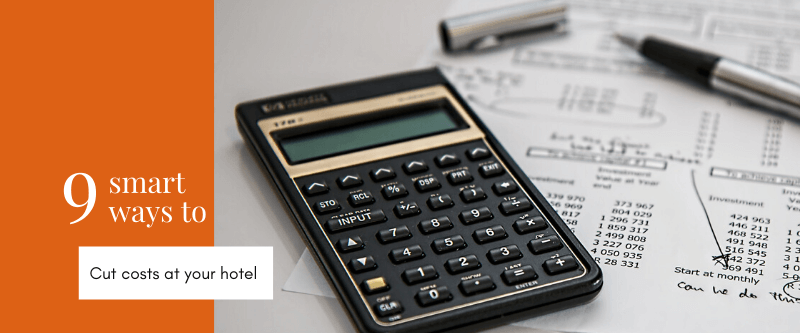Hospitality businesses carry a lot of factors to succeed. They’re not limited to growing revenue and getting more bookings. Rather, a deep dive into cost-saving ideas for hotels along with proper expense maintenance also counts as an important factor for your success.
Cost cutting in hotels, just like in any other business; helps maintain optimum expenses and of course, control your spending on unnecessary activities.
Now, HOW TO CUT COSTS IN HOTEL?
I am sure, you must have thought about it and taken a few steps. After all, who wouldn’t want a higher ROI?
But to be honest, finding ways to cut off hotel costs is a true challenge, especially in locations where the cost of living is high. You may have to dig deeper, think outside the box and get your rational wheels churning.
In this blog, I have shared some basic and advanced cost control techniques in hotels, which can help you start with this step.
However, before we go ahead with that, you should be aware of some sureshot benefits and reasons to implement cost control measures at your property.
Why should hotels cut costs?
Well, you’ll find many practical yet obvious benefits of reducing your hotel expenses. But it all comes down to reasons which provide value. Those are:
- To keep expenses under control: It is a human tendency to spend more given a free hand. Introducing cost-cutting measures in hotels will help you keep a check on the explosion of expenses.
- To increase profit: Since cost-cutting lets, you reduce your unwanted expenses, you can focus on desired revenue goals and increase your profit margin.
On top of that, having a transparent picture of your hotel expenses will give you some ideas on where you can cut back on costs.
Now, let’s dig into some guaranteed and most effective techniques to save costs in your hotel business.
Best Cost Saving Ideas for Hotels
- Analyse your expenses in detail
- Cross train staff for optimum resource utilization
- Use technology to cut costs
- Deploy self check-in kiosks
- Lower electricity costs by going green
- Optimize your hotel’s marketing cost
- Practice preventive maintenance for appliances
- Use your property’s less utilized spaces
- Negotiate with vendors
These are some general cost-cutting ideas for hotel properties. All may not apply, or more than these might also apply for your property.
Let’s go through them one by one.
1. Analyse your expenses in detail
This is the first step towards cutting costs at your hotel property.
To begin with, take some time to sit down and know where your expenses are going.
Hotel management systems are a great help in generating expense and revenue reports.
The busy schedule of entertaining guests and handling other operations can leave you surprised at the expenses incurred.
There might be an unusual spike in bandwidth usage or non-required expenses on cosmetics and linen. Observe your spendings on inventory that could have been a lot cheaper if had taken prompt action.
Make it a habit to analyze your expense reports regularly. Get a breakdown of your operating cost and try to spot some patterns. Small details matter a lot when it comes to reducing hotel expenses and running your business more efficiently.
Taking account of small things is an ideal first step.
2. Cross-train staff for optimum resource utilization
You know as well as I do that hiring staff takes up a large segment of your efforts, time, and expenses.
Almost 50% of your hotel cost is towards the labour.
CBRE Hotels
That being said, cross-training your staff for multiple roles is a good cost-saving idea for your hotel. That way, instead of bringing in new faces for new roles, you’ll be able to use the existing resources.
Learning new skills is a win-win situation for you as well as your team members. They can gain extra skills that will help them in the long run. And you’ll be able to save money on new resource hiring.
For example, employees can help the front desk during peak hours/months to manage walk in guests, requests and complaints from in-house guests. Similarly, when there is not much rush, front desk people can help the marketing team in social media marketing and reaching out to probable guests.
A caution you need to take here is that you do not overburden the staff. This will result in demoralization and will make them ineffective.
3. Use technology to cut costs
The hotel industry is advancing with time and so are the guest’s habits and expectations of the hotels.
However, I’ve seen hotels not investing in technology because they fear insufficient ROI. And a usual misconception revolves around hotel technology being a burden and an additional expense.
BUT, using new technology does not mean an increase in operational costs. Rather, these advancements can help in cost-cutting.
Technology can reduce hotel expenses by automating and optimizing operations.
All-in-one (integrated) hotel technology which includes hotel software, a booking engine, and a channel manager automates and streamlines all operations. These systems take care of bookings, inventory distribution, check-in & check-out, billing, online reviews, housekeeping, and everything else.
This reduces the need for a dedicated resource behind several operations and even saves time.
In fact, a recent report by Hospitality Technology revealed that:
57% of hotels plan to spend more on technology so that they can provide services through advanced software and tools.
Hospitality Technology
In addition to this, it is said that the Internet of Things (IoT) is also going to help in reducing hotel expenses.
Tip: Consider calculating hotel technology ROI before investing to solve your doubts.
4. Deploy self-check-in kiosks
The hospitality industry is rapidly evolving and it has moved from self-bookings to self-check-ins. Guests tend not to wait for long amounts of time to check in or avail of any services at hotels. They want to get things done faster and better.
So, installing a self check-in kiosk is a great way to do cost control in front office.
Though a kiosk cannot completely replace the reception desk, it can cut the labour cost to a great extent; particularly for those on the night shift who is a costly resource.

It can also reduce dependency on manual labour as guests find it easy and convenient to perform self-check-in.
A recent study found that 68% of guests want to speed up the check-in process using their smartphones.
Capterra
That’s because a self-check-in kiosk is hassle-free with simple commands and a clear interface. Above all, a kiosk makes it quick for guests to check in by themselves.
As hotels ultimately want to be more customer-oriented, self-check-in is likely to become an industry standard in the coming years.
You should calculate the ROI of such investments before employing them for hotel cost-saving initiatives.
5. Lower electricity costs by going green
Adopting energy-friendly measures is economically beneficial and also benefits your hotel’s reputation.
The Carbon Trust estimates that you could cut your hotel’s energy bills by as much as 20% just by implementing simple and inexpensive eco measures.
Green Hotelier
Using appliances that consume more electricity and printing unnecessary papers not only increases your operational cost but also hampers your cost-cutting strategies.

Now, one of the most fruitful cost-saving ideas for hotels is reducing electricity costs.
This falls in line with the “Going Green” initiative as well, which is an important step towards saving the environment. Here’s how you can reduce your electricity costs:
- Use LED lights: Using LED bulbs can be more efficient and cost-saving than using normal incandescent bulbs. This saves energy and in turn, reduces the electricity bill.
- Implement smart windows: Windows that automatically adjust their tint all through the day are the smartest thing to embrace. These windows control how much light is passing through them, and adjust cooling or heating in the room as required. This eventually saves the cost of air conditioners cooling the room.
- Use Energy Star appliances: Use certified appliances instead of the old appliances that consume more electricity. Doing so with one appliance won’t make a difference, but slowly replace all types of equipment to see a reduced electricity bill.
Controlling the lighting, using the optimized room and water temperature, and educating staff about saving energy are some of the preliminary steps that can be taken toward going green and cost-cutting.
Incorporating IoT can help with cost control in the hotel industry by adopting some smart techniques. To know about them, read our blog on How Can IoT in Hospitality Industry Grow Your Hotel Business?
6. Optimize your hotel’s marketing cost
Marketing needs research. And getting into a marketing campaign without knowing the facts and figures can trouble your expenses.
Just throwing money without knowing the ROI is an inefficient way to promote your property.
Instead, there can be low-cost ways to spread awareness, such as:
- Great content always sells. Invest in writing good content that speaks for itself.
- Social media is the digital marketing weapon that should be used to reach the maximum audience. Be active there. It will leave a thought in guests’ minds and make them visit your hotel once. (Here are some best social media marketing strategies you can adopt)
- Tie up with local vendors to share/generate bookings
- You can also take brilliant photos of your hotel and show them off to your target audience.
You should analyze the results of your marketing strategies constantly, and decide on the next course of action accordingly. If the results are not what you expect, do not continue with that approach and pick up a new one. That’s how you can optimize your marketing costs.
Tip: Here are some tried and tested hotel digital marketing strategies and promotion ideas to help you grow your hotel business.
7. Practice preventive maintenance for appliances
Maintenance of systems and facilities such as plumbing, electrician, and infrastructure can be quite a costly affair. Preventive maintenance involves inspecting these facilities to prevent unexpected breakdowns.
This works as one of the powerful cost-saving ideas for hotels.
An effective preventive maintenance method takes into account all the infrastructural specifics of your property and plans the annual maintenance schedule in a way that doesn’t interfere with the guests’ experience.
There are many IoT solutions in the hospitality industry that help you follow maintenance schedules with smart devices.
In addition, different applications in the market can automate maintenance schedules for the types of equipment. They also help managers keep a tab of all the schedules to avoid unnecessary repairs.
Timely and well planned maintenance and repair is cost effective. Lack of the same can result in high penalty costs that disturb your operating budgets as well as guest experience.
Some breakdowns need repair immediately and the cost cannot be cut down here. But if you follow a regular maintenance schedule and get the equipment checked from time to time, there will be fewer chances of a sudden failure or breakdown.
Thus, preventive maintenance helps reduce hotel expenses by keeping equipment intact for a longer time.

8. Use your hotel’s less utilized spaces
Look into every nook and corner of your hotel to find spaces that are not used often.
Ideally, cutting operational cost and generating revenue go hand in hand.
Using underutilized spaces for business purposes is a good way to earn a side income. There might not necessarily be a permanent setup for the same. So, this works as a revenue generation strategy as well as a perfectly practical cost-saving idea for hotels.
For example; you could use your garden for weddings, parties, or events. Deliver a great experience to the guests who attend these events and they could turn into your future guests too.
If you have a hall; use it for a yoga class or a dance class. This way, the guests will also spend a little extra money during their stay; thus increasing your revenue.
An upcoming trend is to use your hotel lobby as a workspace, a social hotspot, a coffee shop or any flexible space that can be used for almost everything.
Setting up such a lobby will add value to your property, not to mention the income earned. There can be other ways to use these spaces and promote your hotel during the off-season. You can find some low-season promotion ideas to use these techniques and generate revenue.
9. Negotiate with vendors
Negotiating the right deal with your suppliers doesn’t necessarily mean getting what you want at the cheapest possible price. Negotiation is done right only when both parties feel happy and comfortable with the agreement.
While setting up your hotel, you take the best deals from your suppliers and vendors. After that, as the contracts come close to a renewal date and you know the expenses involved, you might have to crunch it a little.
It will be reasonable to ask for a discount when you are renewing your contracts. You can also get quotes from other vendors to pick up the best one in terms of both quality and cost.
Before closing on a vendor, know the optimum cost of what you are investing in.
For example; if you are ordering cosmetics or other supplies in bulk, you might want to look for a good vendor who gives you a good discount. Or, if you are investing in complex software, you could negotiate with the dealer for free training as a part of the deal.
FAQs
Be as consistent as possible. You must be having monthly, quarterly, and half-yearly growth meetings at your property. Analyzing your expenses at those times is ideal.
It completely depends on the type and number of employees you have hired. Team members who have extensive responsibilities are not suggested to go for cross-training. Otherwise, this may affect their productivity.
If the situation is not in your control (viz. COVID-19 pandemic), you might need to take such steps to cut down costs. It’s just one of the last ways hotels can save money to survive.
All the cost-cutting techniques in hotels shared in this blog are safe and recommended to be used in the long term. The steadier you are, the better position you will be in.
Picking the right hotel software is a challenge in itself. There are various factors to consider apart from the budget. Check out our blog on how to select the right hotel software. It will guide you in making the right choice.
To start with, a hotel PMS, and with it, a seamlessly integrated channel manager is highly recommended to be deployed to reduce costs. Following this, you can consider opting for a booking engine to gain direct bookings, a reputation management system, and such.
Conclusion
These cost-cutting techniques may or may not be suitable for all types of hotels. You are advised to implement them at your discretion.
Your property and staff could experience various benefits if you implement these cost-saving ideas properly. You can increase pay for employees, purchase better equipment, invest more towards successful marketing and plan the year well ahead.
The hotel industry is highly competitive and the cost of running a business is always rising. But there can always be ways to keep the expenses low and run the hotel methodically. Look for solutions that fit best in your property, cut down costs, and increase revenue at the same time.
Mention in the comment section below if you know of more ways to cut costs or if any of these ways have worked for you.


